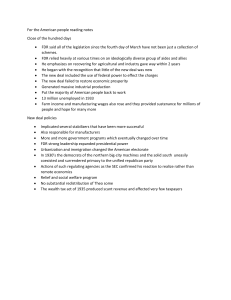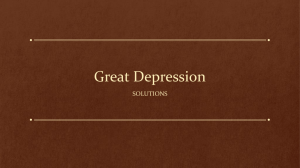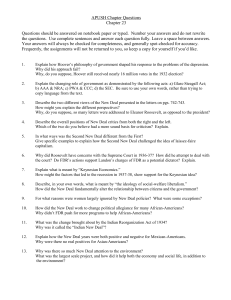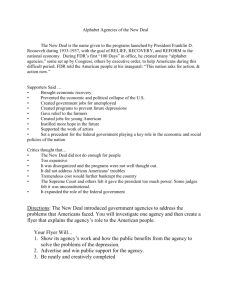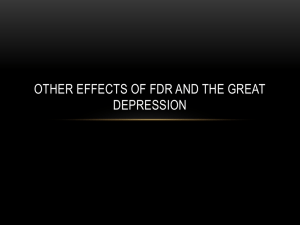Effects of New Deal
advertisement
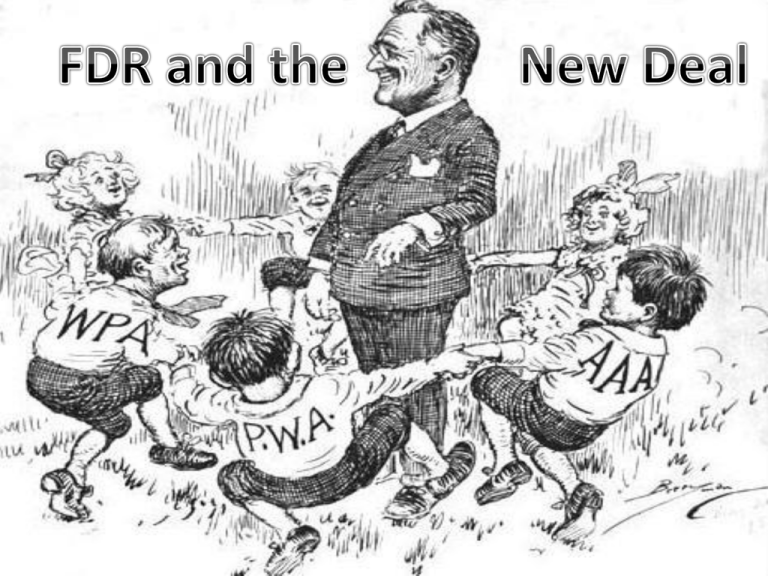
Republican President Herbert Hoover Democrat Governor of NY Franklin D. Roosevelt Outcome: • Americans are ready for a change by 1932 • Hoover blamed for doing nothing • FDR wins (23 million to 16 million votes) - In acceptance speech FDR promises “a new deal for the American people” Born 1882 in Hyde Park, NY - 5th cousin of Theodore Roosevelt Married in 1905 to Eleanor Roosevelt Attended Harvard & Columbia Law School 1910 elected to New York state Senate 1913 appointed Assistant 1920 Democratic Nominee Secretary to Navy by Wilson for Vice President w/Cox 1921 stricken w/Polio (paralyzed from waist down) 1928 elected Governor of New York Prior to FDR’s inauguration as president: • Handpicks advisors (professors, lawyers, journalists) nicknamed his Brain Trust • Develops the New Deal FDR’s program to ease the problems of the Great Depression Three Goals of New Deal: 1. Relief (immediate help for the needy) 2. Recovery (temporary programs to restart economy) 3. Reform (programs to prevent another depression) Hundred Days: period of intense activity by FDR’s administration once taking office Outcome: • Congress passes 15 pieces of New Deal legislation • Expanded the governments role in the economy Fireside Chats: • Informal radio talks from FDR to the American people • Discusses issues of concern and explained New Deal programs Outcome: • American public felt like FDR was talking directly to them and their needs were going to be met Step 1 Reform: Banking and Financial Reforms • Closes all banks (Bank Holiday) (March 5, 1933 1 day after taking office) • Emergency Banking Relief Act – Treasury Dept. inspects banks – Banks that were sound can open & those that can’t pay debts remain closed – Banks which need help can receive loans from govt. Outcome: • Revived American’s confidence in banks • Glass-Steagall Act – Established the Federal Deposit Insurance Corp. (FDIC) – Provided federal insurance for individual bank accounts up to $5,000 Roosevelt signing the Glass-Steagall Act in 1933 FDIC logo (1933) Outcome: • Reassured customers that their money was safe Federal Securities Act – Required corporations to provide complete information about their stocks – Corporations were made liable for any misrepresentations Securities and Exchange Commission (SEC) Roosevelt signing the Glass-Steagall Act in 1933 – Prevent anyone with inside information from “fixing” the stock market for their personal profit SEC logo (1934) Outcome: • Regulated the stock market • Americans gain some confidence back in the stock market Step 2 Recovery: Help the American economy w/jobs • Agricultural Adjustment Act (AAA) – – – – Goal = raise crop prices by reducing supply Govt. would pay farmers NOT to seed every acre Govt. would pay cotton growers to plow under existing crops Govt. would pay hog farmers to slaughter a % of their pigs Outcome: • Upset many who were hungry to purposely destroy food • Overall…. prices did rise and farmers made more money • Tennessee Valley Authority (TVA) – Goal = develop the badly depressed Tennessee River Valley – Govt. paid for projects in the region which created jobs » Repair and Construct Damns » Provide Flood Control » Institute Hydroelectric power Outcome: • Provided much needed jobs and improved the overall economy of the region • Civilian Conservation Corps. (CCC) – Goal = provide relief through work projects which provide jobs – Govt. paid men, gave lodging, food, & uniforms (age 18-25) to: » » » » Build Roads Develop new and existing Parks Plant Trees Help with soil-erosion and flood-control Outcome: • Provided 3 million men with jobs and wages • Provided new infrastructure within America • Helped reforest the Great Plains to prevent another Dust Bowl National Industrial Recovery Act (NIRA) – Provided money to states to create jobs – Created the 3 following programs: 1. Public Works Administration (PWA) – built large-scale public works such as dams, bridges, hospitals, and schools – Goal: provide jobs & stimulate the economy 2. Civil Works Administration (CWA) – built bridges and various public buildings – Goal: rapidly create manual labor jobs for millions of unemployed workers Outcome: • Built 40,000 schools • Paid 50,000 rural teachers salaries • Built 500,000 miles of roads 3. National Recovery Administration (NRA) – Goal = establish codes of fair practice for industries » Set prices of products » Established standards for products Outcome: • Limited production and established prices • Led Congress to guarantee workers right to unionize and bargain collectively Step 3 Relief: Help Americans at home Home Owners Loan Corp. (HOLC) - Govt. will provide loans to homeowners who faced foreclosure Federal Housing Admin. (FHA) - Govt. backed loans for mortgages & home repairs Federal Emergency Relief Admin. (FERA) - Govt. funded 500 million for direct state relief of the needy - Provided food & clothing to unemployed, elderly, and ill - Provided work relief to those unemployed Outcomes: • Assisted the unemployed with jobs, food, and clothing • Enabled needy Americans to re-gain their self-confidence and self-respect How to pay for the New Deal? Deficit Spending: Spending more money than the government receives in revenue Liberal Critics: Conservative Critics: • New Deal didn’t go far enough to help the poor and reform the nation’s economic system • FDR spent too much money on direct relief • FDR used New Deal to take federal control of business and the economy Other Critics: • New Deal interfered with a free-market economy Charles Coughlin: Dr. Francis Townsend: • Catholic priest & radio host • Accused FDR of NOT doing enough to fight the depression • Doctor & California Health Officer • FDR NOT doing enough to help poor & elderly • Suggests a pension plan for the elderly Huey Long: • Senator of Louisiana • His Solution: Share the Wealth - suggests higher taxes on rich & redistribute money to the poor (Robin Hood Theory) 1935: Supreme Court rules the NIRA unconstitutional 1936: Supreme Court rules the AAA unconstitutional 1937: FDR proposes a Court Reform Bill to appoint 6 new justices Americans & Congress accuse FDR of violating the U.S. Constitution 1937: a justice retires & FDR appoints a liberal judge who supports the New Deal Republican Kansas Gov. Alfred Landon Democrat President Franklin D. Roosevelt Outcome: • Overwhelming victory for FDR • Democrats win in both Houses • 1st time Blacks vote Democrat • 1st time Labor backs a candidate Second New Deal to address the problems of the elderly, the poor, and unemployed Soil Conservation and Domestic Allotment Act: – Paid farmers for cutting out crops which deplete the soil – Rewards farmers for using soil conservation methods Second Agricultural Adjustment Act (1938): – Brought back most features of 1st AAA – Removed the tax to pay for farm subsides (part ruled unconstitutional) Resettlement Administration: – Govt. provides loans to small farmers to buy land – Replaced by Farm Security Administration: – Govt. loaned money to tenant farmers to buy land – Govt. established camps for migrant workers Works Progress Administration: – Purpose: to provide the unemployed with jobs in: • • • • • Teaching Construction Garment Making The Arts Other Wagner Act: – – – – Re-established collective bargaining rights Protected workers right to join unions Prohibited unfair labor practices Created National Labor Relations Board (NLRB) to hear cases about unfair labor practices Fair Labor Standards Act: – – – – Set maximum hours of work a week (40 hrs) Set up a federal minimum wage (25 cents) Set rules for employment of those under 16 Banned hazardous work for those under 18 Social Security Act: – Three Parts: 1. Old-age insurance for retirees 65 and older (plus their spouses) 2. Unemployment compensation system 3. Aid to families with dependent children and the disabled National Youth Administration: – Purpose: to provide education, jobs, counseling, and recreation for youth Rural Electrification Administration (REA) – Purpose: Govt. financed and worked with electrical companies to bring electricity to rural areas Public Utility Holding Company Act – Purpose: to regulate public utilities – Outlawed ownership of utilities by multiple holding companies Women – Provided some women with the opportunity to increase their political influence and to promote women’s rights Eleanor Roosevelt - Transforms role of the First Lady - Led fight for equality for woman African Americans – Eleanor Roosevelt protests against racial discrimination and urged the President improve their situation – Black Cabinet African American leaders who advised FDR on racial issues Mary McLeod Bethune: member of the Black Cabinet - Believed the New Deal created a “new day” for African Americans - She noted that African Americans gained unprecedented access to the White House and positions within the government under FDR Native Americans – New Deal helped the lives of Native Americans – Indian Reorganization Act: moved away from assimilation and more towards autonomy – Ownership of “Reservation Land” to the Native Americans – Native American lands would belong to entire tribe – Native Americans could attend school on reservations – Tribes can elect tribal councils to govern reservations New Political Coalition – New Deal Coalition brought together southern whites, northern blue-collar workers, poor mid-western farmers, and African Americans • Prior to FDR, African Americans voted Republican • Gave power to the Democrats from 30s-mid 90s Expands Power of the Government – Govt. broke from the tradition of laissez faire – Govt. was expected to intervene Created a Welfare State – Govt. assumes the responsibility for providing for the welfare of children and the poor, elderly, sick, disabled, and unemployed • This was new to the U.S., the American people had never been given aid by the gov’t before Changes the Presidency – President plays greater role in govt. – Led to an amendment to be added: • 22nd Amendment limits the amount of terms a president can serve – Why ? Environment – Following in the footsteps of his cousin FDR set aside 12 million acres of land for new national parks Overall The New Deal: • Provided relief and reform • Expanded role of the govt. • Increased power of presidency • Provided new opportunities for women • Improved the lives of Native Americans *Please Note* - The New Deal DID NOT end the Great Depression - WWII DID with its massive military spending
